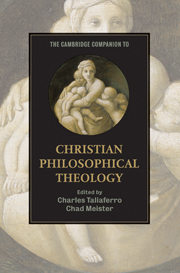7 - Incarnation
from Part II - God in relation to creation
Published online by Cambridge University Press: 28 May 2010
Summary
Charity has compelled the Christian community to engage in some serious metaphysics. The Christian is told to spread the Good News, and the Good News is that God has become a human being in order, by his death and resurrection, to free us from our sins and bring us to life eternal. Good News indeed! But difficult philosophically. How could the omnipotent, eternal, and immutable source of all possibly “become” a human being? And why in the world, given divine omnipotence, would God choose such a messy and complicated process for the salvation of mankind, when, presumably, he could save us by divine fiat? Christian theologians and philosophers have unanimously agreed that the Incarnation is a mystery that we cannot hope to fully grasp. Yet, for two millennia, they have struggled to meet the challenge of the unbeliever who says that the Incarnation is worse than a mystery: it is an impossibility. From the beginning of Christianity, the charge has been made that the Incarnation is, at best, demeaning to God: It is unthinkable that divinity would submit to the biological nastiness involved in Incarnation! At worst, it has been argued, the key claim of Christianity is just logically contradictory. In this chapter I defend the traditional understanding of the Incarnation. By the traditional understanding, I mean the view that was proclaimed to be the correct one, as against a legion of heresies, at the Council of Chalcedon in 451.
- Type
- Chapter
- Information
- The Cambridge Companion to Christian Philosophical Theology , pp. 95 - 107Publisher: Cambridge University PressPrint publication year: 2009
- 1
- Cited by



